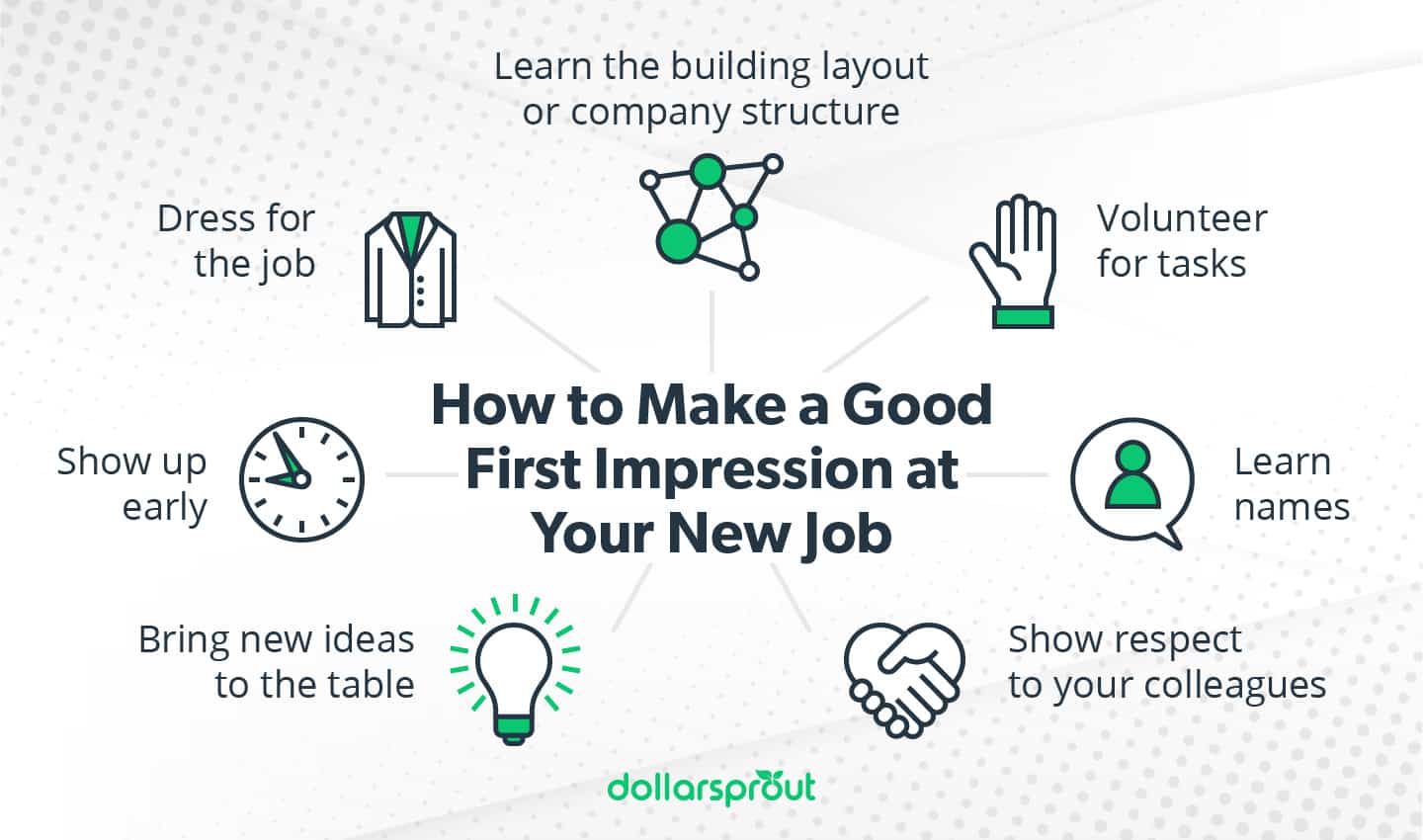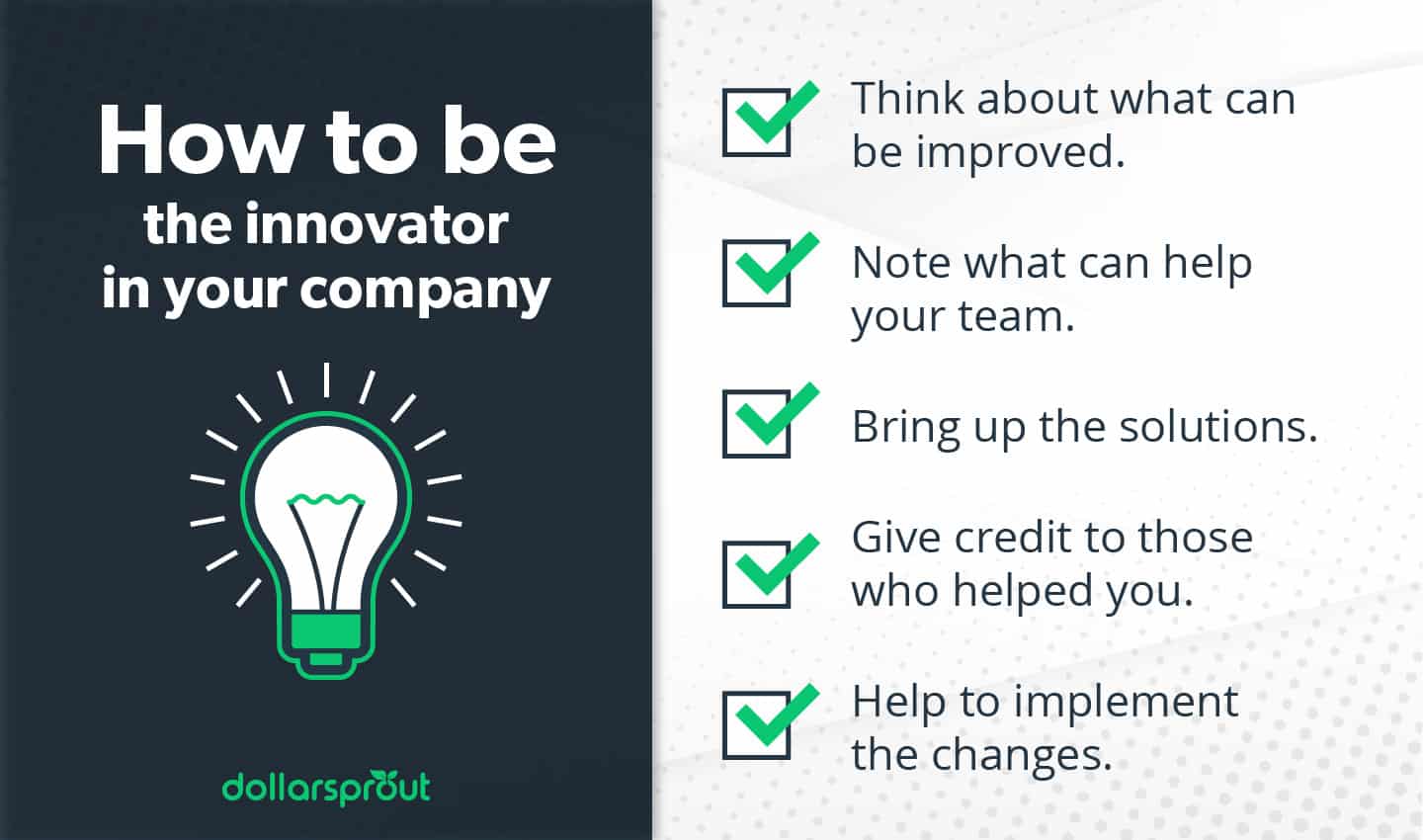How to Make a Good First Impression at a New Job
Our readers always come first
The content on DollarSprout includes links to our advertising partners. When you read our content and click on one of our partners’ links, and then decide to complete an offer — whether it’s downloading an app, opening an account, or some other action — we may earn a commission from that advertiser, at no extra cost to you.
Our ultimate goal is to educate and inform, not lure you into signing up for certain offers. Compensation from our partners may impact what products we cover and where they appear on the site, but does not have any impact on the objectivity of our reviews or advice.
Soft skills in the workplace are important. They can help you fit in and succeed in your new role. Whether you work remotely or in an office, start showing the right traits by taking these steps.

Some of the links on DollarSprout point to products or services from partners we trust. If you choose to make a purchase through one, we may earn a commission, which supports the ongoing maintenance and improvement of our site at no additional cost to you. Learn more.
Day one of your new job can be intimidating. You know you need to learn the ins and out of your new role, but you also want to get along with your coworkers and managers.
The first day at a new job “sets the tone for what kind of worker you’ll be in the future,” says Darren Easton, Vice President and Creative Director at The Cyphers Agency. “If you immediately show that you have a good, positive attitude and get along with people, you’ll be someone who your coworkers not only want to work with but also support if and when you face challenges.”
People can form first impressions within seven seconds, according to Psychology Today.[1] These can turn into long-term perceptions that inform your success in your role and your career, making it important to get it right from the start.
7 Ways to Make a Good First Impression at Your New Job

Your new colleagues and supervisors will notice whether you exude confidence, emotional intelligence, and leadership qualities. These soft skills in the workplace are important because they can help you fit in and succeed in the new role.
Whether you work remotely or in an office, start showing these traits by taking the following steps:
1. Show up early.
Showing up early conveys you’re responsible, organized, and you value your job. But it’s important to time this right, depending on the type of job you have. Remote workers should log in to conference calls a minute or two early, and hourly employees should arrive just a few minutes early as well. Although you’re not getting paid for the extra time, timeliness can set a good tone on the first day at a new job.
If you’re a full-time in-house employee, then your manager may need time to prepare for your arrival — and you don’t want to come across as overeager. A good rule of thumb: Arrive 15 minutes early with in-person jobs, suggests Myra T. Briggs, Executive Search Consultant and Practice Leader at Nonprofit HR.
“That gives you time to sign in with security, figure out parking, or grab a cup of coffee. Then, announce yourself five minutes before your start time,” Briggs says.
And if you haven’t done the commute before, practice it once or twice ahead of your first day. Arriving late because you got lost or hit traffic can come across as disorganized.
Related: 11 Good Work Habits for Becoming a Stand-Out Employee
2. Dress for the job.
You don’t need to dress like the executives, but your attire does need to reflect that you take your work seriously. Ask about the dress code during the interview process, and show up in your best version of it on your first day.
“If the everyday culture is jeans and athletic shoes, for instance, opt for pristine jeans, casual shoes, and a business-casual top,” Briggs says.
Many organizations have a “dress for the day” policy, Briggs adds. That means you should dress appropriately for the obligations of each day but may dress casually if you don’t have any externally facing responsibilities.
And if you work remotely, your shirt might be the only piece of clothing that appears on video conference calls. It should look professional, though, and you should appear groomed with a clean background.
3. Learn the building layout or company structure.
You’ll probably get a tour of the building on your first day at a new job, but you likely won’t be expected to remember where everything is.
Knowing where you can find key rooms — offices, the bathroom, or the break room — can help you appear organized. Plus, you’ll save time by not getting lost. Your human resources manager might have a chart of the building and where everyone sits, but you can also make your own chart or simply take notes.
Remote employees should ask for a list of employee names, titles, and email addresses. Start figuring out who you should contact and for what purpose.
Every new job comes with a learning curve, so don’t be afraid to ask a coworker for help or directions or even who is responsible for what tasks. It can be a good way to strike up an initial conversation and form work friendships.
4. Bring new ideas to the table.
Innovation is a trait that most managers love to see. But you might appear egotistical if you show up on the first day at a new job with a list of changes. Instead, try this longer-term process of developing ideas, which can start on your first day:
- As you carry out the main tasks of your job, think about what can be improved.
- Write down notes about new processes, projects, and tools that can help your team.
- At an appropriate time — during catch-ups with your supervisor or in meetings, for example — bring up the solutions you’ve thought through.
- If another employee helped with the brainstorming, give them credit.
- If your schedule allows, help implement the changes.
Creating these new ideas can help you stand out at work and get ahead in your career.
5. Volunteer for tasks.
When you volunteer for tasks, you show initiative and a willingness to learn something new. You might offer to make a photocopy, email a client, or organize a meeting.
As a new hire, 90% of your attention should go toward learning your job, while the other 10% can go toward these small tasks, says Kathy Robinson, Founder of TurningPoint, a company that provides career counseling. You want to be sure you dedicate enough time to learning your role.
However, “you have to be careful not to become the dumping ground for grunt work that no one else wants to do,” Robinson says.
Try to strike a balance between being helpful and staying productive at work. Stay connected with your boss, whether it’s through regular catch-ups or occasional emails, to make sure what you’re agreeing to take on is actually doable.
6. Learn names.
According to a Psychology Today article, 85% of adults forget names. But learning names is critical, from the people you interact with most, like your managers and coworkers, to the building receptionist, maintenance staff, security, and so on.
“It’s a sign of respect,” Briggs says. “It’s always a challenge, but taking the time to do this shows you value your coworkers. It’s also very important to learn how to pronounce names, so don’t be afraid to ask.” By knowing people’s names, you’ll also be seen as an insider, which will help you fit in with the company and exert influence in your role.
During your first conversation with someone, repeat their name. Ask them to spell it if it’s complicated. Then, repeat the name when you say goodbye. You can also use what Psychology Today calls the “look, snap, connect” method:
- Look: Focus on the name.
- Snap: Create a mental image of the name and face.
- Connect: Connect the name and mental image so you can retrieve the information later.
If the person uses a nameplate in their office or on their desk, that can help, too.
7. Show respect to your boss and coworkers.
Respect is a key feature in any work environment. It promotes teamwork and professionalism and lets people know they’re valued. In fact, “more than anything, people want to feel heard and respected at work,” Robinson says.
You can show respect in many ways, starting with these small steps:
- Practice good body language. About 55% of communication is shared through body language. You can send a respectful message by making eye contact, standing tall with good posture, and not crossing your arms or rolling your eyes.
- Be a good listener. When another person is talking, don’t interrupt. Listen to what they’re saying, then add something valuable to the conversation.
- Do your work. You might fall behind on work if you arrive late, get lost in work gossip, or don’t manage your time well. Coworkers may have to pick up your slack, which can communicate that you’re inconsiderate.
- Be punctual. Arrive to work on time and make sure you complete your work by the deadline. Then take a few minutes here and there to form bonds with your coworkers.
- Practice clear communication. When you discuss work projects with your coworkers through email or in person, be straightforward so they know exactly what you need. Practice using diplomatic language to come across respectfully.
- Don’t dump your work problems on others. Issues arise at work all the time, but what’s important is how you solve them. Try to find solutions and remain level-headed before you bring the issue to someone else. Explain how you think they can help.
If you find that you’re struggling with respecting a coworker for whatever reason, talk to your manager or human resources. They might have some suggestions or be able to facilitate a meeting to work out the issues.
The First Day at a New Job Sets a Precedent for the Future
Robinson says good organization is the main ingredient behind forming a good impression and developing your long-term career. Organized people typically get their work done because they manage their time well, suss out problems (and potential solutions), and may have time to volunteer for extra tasks.
Eventually, you can even ask for a raise once you’ve proven yourself a good employee.
“The more you can deliver, the more likely you are to make a good impression,” Robinson says, “and, ultimately, get the career progression you want.”









